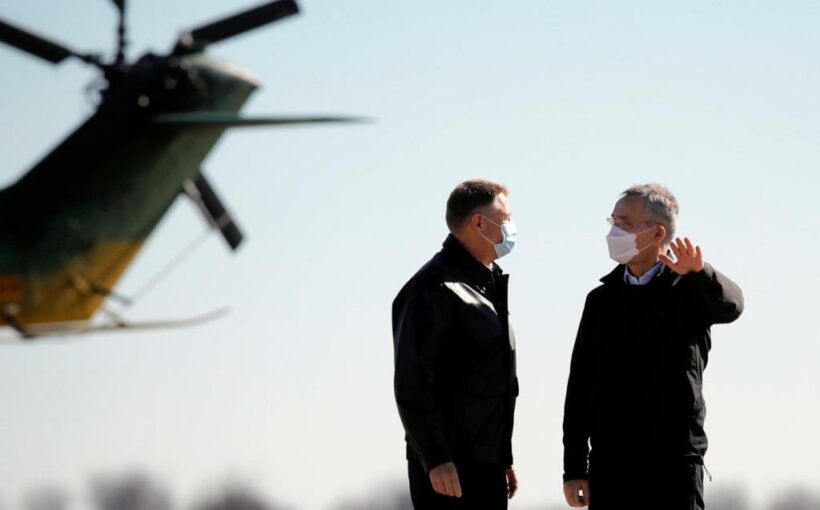BRUSSELS — The chill of a Cold War hung over Eastern Europe again Friday, with Russian maneuvers and drills close to Ukraine, and NATO’s chief boosting troop morale on the Black Sea.
Diplomats and government leaders, meanwhile, struggled ever more to jumpstart moribund talks to stave off full-out war.
Here’s a look at what is happening where and why:
Prepping and posturing
In Romania’s Black Sea port of Constanta, the rumble of U.S. heavy military material was breaking the dawn quiet, signs that reinforcements and 1,000 more troops were coming into an airbase there.
It was yet another indication that hardware was being beefed up around the strategic Black Sea where Russia, Ukraine and three NATO allies have bases.
“From here in the Black Sea region, all the way to the Baltic, allies are stepping up to reinforce NATO’s presence at this critical time,” NATO Secretary-General Jens Stoltenberg said from Constanta. Romania’s neighbor Bulgaria will also welcome Spanish jets to increase the potent presence of the alliance.
In Black Sea waters, warships of Russia’s Baltic and Northern fleets arrived in Sevastopol bay on the Crimean Peninsula, which Russia already annexed in 2014. The ships join several similar vessels that are part of Russia’s Black Sea fleet, augmenting its amphibious landing capability.
Moscow has announced sweeping drills in the Black and Azov Seas in the coming days and closed large areas for commercial shipping, drawing a strong protest from Ukraine.
Off Ukraine’s northern border, Russia and its ally Belarus are starting 10 days of war games, involving massive drills with live ammunition.
“There is a risk for a full-fledged invasion,” warned Stoltenberg, but added other threats were lurking too, “including attempts to topple the government in Kyiv.”
Tanks trump talks for now
Despite the flurry of flights crisscrossing Europe to bring leaders together around the tables of diplomacy over the past weeks, the results have been far less spectacular as both sides continue to wait to see who will blink first over the issue.
The only slightly positive news Friday seemed to come out of Moscow, where British Defense Secretary Ben Wallace said he had had a “constructive, frank” discussion with Russian counterpart Sergei Shoigu.
“I heard clearly from the Russian government that they had no intention of invading Ukraine,” Wallace told reporters in Moscow. He added: “We will judge that statement on the evidence.”
Talks in Berlin between Ukraine and Russia, joined by France and Germany, at first held hope for some progress as they lasted into Friday morning, but at the end, nothing palpable emerged.
“Unfortunately, almost nine hours of talks have ended without any significant results,” Russian Deputy Chief of Staff Dmitry Kozak said. It remained unclear when and how the next attempt at a breakthrough would be made.
A 2015 peace deal brokered by France and Germany in a similar so-called Normandy format helped halt large-scale battles in the wake of the 2014 Russian invasion, but regular skirmishes have continued. The Kremlin has accused Kyiv of sabotaging the agreement, and Ukrainian officials argued in recent weeks that implementing it would hurt their country.
Across the world in Melbourne, Australia, U.S. Secretary of State Antony Blinken was downbeat.
“We’ve made every possible effort to engage Russia, to look at the concerns that it’s raised, to share concerns that we have , that European partners and allies have,” he said. But the gap with Moscow remains yawning.
“Simply put, we continue to see very troubling signs of Russian escalation, including new forces arriving at the Ukrainian border. And as we said before, we’re in a window when an invasion could begin at any time,” Blinken said.
Later Friday, Biden was is holding a call with trans-Atlantic leaders to discuss shared concerns about Russia’s continued buildup of military forces around Ukraine, and to coordinate on diplomacy and deterrence.
Biden urges Americans to leave Ukraine
Because of the perilous state, Blinken insisted “that any American citizens who remain in Ukraine should leave now.”
He echoed President Joe Biden’s warning.
“We’re dealing with one of the largest armies in the world. It’s a very different situation and things could go crazy quickly,” he said in an interview with NBC News broadcast late Thursday.
Asked whether there was any scenario that would prompt him to send U.S. troops to Ukraine to rescue Americans, the president said: “There’s not. That’s a world war when Americans and Russia start shooting at one another.”
He argued that if Putin is “foolish enough to go in, he’s smart enough not to, in fact, do anything that would negatively impact on American citizens.”
Asked whether he’s ever said that to Putin, Biden said: “I didn’t have to tell him that. I’ve spoken about that. He knows that,” Biden said.
Source: Read Full Article
